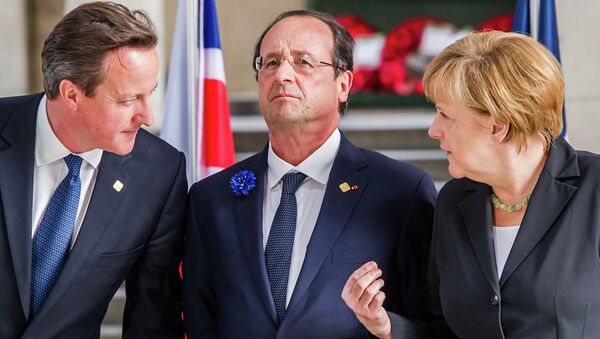He went to the EU summit this week hoping for a sympathetic ear from the leaders of the other 27 countries and the promise of talks resulting in EU treaty changes. Cameron is keen to distance the UK from the "ever closer union" in order to assuage Eurosceptics within his party.
However, Le Monde newspaper in May revealed that Germany's Angela Merkel and France's Francois Hollande have signed an accord promising to promote a tighter political union in the Eurozone, while operating within the confines of the existing treaties.
It is reported that, when Cameron addressed the others leaders at dinner on Thursday night, his eight-to-ten minutes speech was greeted with silence. Neither Merkel nor Hollande responded.
I met UK PM @David_Cameron ahead of the European Council meeting; he will update us on road to UK referendum. #EUCO pic.twitter.com/Yz62BdPFo1
— Donald Tusk (@eucopresident) June 25, 2015
The European Council President, Donald Tusk, said:
"One thing should be clear from the very beginning. The fundamental values of the EU are not for sale and so are non-negotiable. We should consider British concerns, but only in a way which will be safe for all Europe."
Cameron admitted to reporters that, even if he secures some treaty changes — against the wishes of France and Germany, as well as several other countries — the process of ratifying them will take such a long time, that they will not be in place before the referendum.
Post-Dated Cheque
A senior British official told reporters that Cameron is confident he can achieve a "legally binding and irreversible" process to revise the Lisbon Treaty, that itself revised previous ones and created a long-term President of the European Council and a new High Representative of the Union for Foreign Affairs and Security Policy.
Cameron on EU referendum: "No chance" of change before Britain's in/out vote. in-Out or 'Maybe' option on ballot. pic.twitter.com/TMo3m32R5x
— Denis Skinner (@BolsoverBeast) June 26, 2015
However, the official said: "There will be political agreement [of] 27 that these changes will be done. Then there is a process of ratification of those which can take a long time because it needs to be ratified in all 27 countries."
Nigel Farage, the anti-EU UKIP leader, said: "It sounds like a post-dated cheque. There are so many big fundamental things happening that a promissory note of some kind to Britain may well finish up not being honoured. Post-dated cheques can bounce and one suspects that any post-dated cheque that was given to the Brits would be given by presidents and prime ministers in office now.
"By the time it came to be honoured there would be different prime ministers and different presidents who have been elected on a ticket saying we won't honour this note anyway. It doesn't work on any way you look at it," he said.



